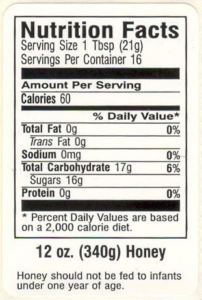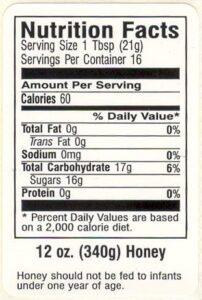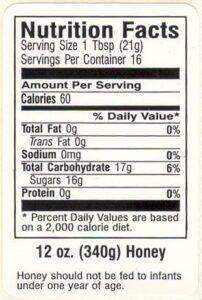Natural Honey is a highly concentrated or supersaturated solution of sugars from flower nectar gathered by honeybees. The complex flavors of local honey are a unique combination of the flora within a geographic location and the influences of climate and soil. Flower nectar is the treat or payment to bees provided by plants in trade for pollination. Honeybees drive off the water concentrating the nectar which accomplishes two major objectives of saving space and naturally creating a substance that protects the sugars from spoiling. This honey is placed into a matrix of storage cells made of wax called honeycomb mostly for future consumption in winter where the carbohydrates are essential for heat generation protecting the queen from the cold.
Honey Care: Pure honey is fairly resilient. To protect the delicate flavors of your honey store it at room temperature away from direct light in the pantry or cabinet to protect it from temperature fluctuations. Pure Honey will never spoil or need refrigeration; refrigeration may increase the natural crystallization process. Only pure natural honey will crystallize and can be made liquid again with gentle, slow warming however never warm above 95° F (35° C) as it will compromise the chemical composition actually making the honey susceptible to spoilage.
- Why does honey crystallize?
Why does honey crystallize? Honey is a supersaturated solution meaning that there is more sugar dissolved in it than technically the water can hold. The high concentration of sugar makes the solution unstable and over time the sugar will precipitate out and crystallize. Only raw natural honey crystallizes.
- Will honey help my allergies?
Will honey help my allergies? Yes! Natural raw honey contains pollen. Eating raw honey can provide some relief from allergies. It is best to use local honey for allergy relief.
- What else should I know about honey?
What else should I know about honey? Honey is a natural sweetener, has antioxidants, and is fat-free and cholesterol-free.

- What is honey?
What is honey? Honey is concentrated flower nectar that has been processed by bees. The bees ingest the nectar and enzymes break down complex sugars into simple sugars. The bees then place the honey in wax cells and fan it with their wings to remove the excess moisture. Honey is 80% natural sugar, mostly fructose, and glucose. Honey is much sweeter than table sugar.
- Does honey contain any nutrients?
Does honey contain any nutrients? Honey contains vitamins B6, niacin, riboflavin, and pantothenic acid. It also contains minerals and amino acids.
- How many calories in honey?
How many calories in honey? Each tablespoon of honey contains about 60 calories. Honey has a healthy glycemic index (GI) because its simple sugars are gradually absorbed into the bloodstream. It may be better than some other sweeteners for those who need to watch their sugar intake.
![How Many Calories In Honey? Https://Www.brightonhoney.com/Honey-Facts/ honey nutrition information]()
Here are the nutritional facts for our 12oz bears of honey.

- What percentage of honey is sugar?
What percentage of honey is sugar? Honey is about 80% sugar. Honey is completely natural and healthy, but it is still sugar. If you should not eat sugar, you should not eat honey.
- Can diabetics eat honey?
![Can Diabetics Eat Honey? Https://Www.brightonhoney.com/Honey-Facts/ honey nutrition label brightonhoney.com]() Can diabetics eat honey? Although diabetics should limit their sugar intake, including honey, your doctor may tell you that honey could be a healthier choice than table sugar in a diabetic diet.
Can diabetics eat honey? Although diabetics should limit their sugar intake, including honey, your doctor may tell you that honey could be a healthier choice than table sugar in a diabetic diet.Consuming honey can be a contentious issue for people with diabetes. For some, it is part of a healthy diet; for others, it could raise blood sugar levels too high. Find out what benefits and risks are associated with eating honey if you have diabetes or pre-diabetes.
Understanding How Honey Impacts Blood Sugar Levels
When considering the potential impact of honey on diabetic blood sugar levels, it’s important to understand that honey is comprised of fructose and glucose. Eating honey means that both types of sugars are entering the body simultaneously, which could cause a spike in insulin or blood sugar levels. People with diabetes should be mindful of the amount of honey they consume in order to not increase their risk for further complications.
Moderation is Key to Avoiding Unwanted Reactions
For individuals with diabetes, eating honey can be a tricky situation. Consuming too much honey could lead to increased blood sugar levels and other potential complications. Research suggests that people should limit their intake of honey when possible, as it is still a high-sugar food that has the potential to cause unwanted reactions. Moderation is key for those who have diabetes and want to enjoy the benefits of honey.
- Will honey help my cough?
Will honey help my cough? Yes! Honey is a long-trusted remedy for temporary relief from coughing. Honey has also been shown to be more effective in treating children’s coughs than over the counter cough medicines.
- Does honey go bad?
Does honey go bad? No, honey is the only thing in your kitchen that does not go bad. Honey can last for centuries if stored properly.
Honey is a natural antibiotic and honey has been used for treating wounds throughout pre-history. Honey in modern medicine has been used to treat wounds. The natural properties of honey help clear infections and reduce inflammation, and may stimulate the re-growth of tissue according to some studies.
Because my honey is untreated, unheated, and unaltered, it may contain organisms that are naturally present in raw honey. Honey is a natural antibiotic and it is safe to eat raw honey, but the FDA advises that infants not be given raw honey. It should be heated first to kill any organisms. Some cultures feed newborn babies, honey, even before they are given milk. There is pasteurized honey that is available for this. Raw honey is not for infants.
Holistic Honey and Allergies
There are many claims about the holistic benefits of Honey. Honey has been claimed to slow aging, prevent hair loss, improve digestion and reduce hay fever symptoms. Some have these have been scientifically proven.
The connection between allergies and honey is that honey is made from the very things that cause hay fever. Bees collect Pollen and Nectar from trees and plants – all the things that make us sneeze. These are treated and altered inside the bee and turned into honey. Honey has small amounts of pollen proteins and other stuff of flowers.
It has been reasoned that these fragments of pollen proteins and complex carbohydrates can cause a tiny reaction in our bodies that will stimulate our systems to learn to tolerate the allergens.
Local honey is made from the local flowers that cause hay fever. In the Spring bees harvest the pollen of Maple, Oak, and other trees that cause Spring hay fever. In the Fall, bees harvest ragweed, goldenrod, and Queen Anne’s lace.
Eating local honey every day is supposed to be a kind of immunotherapy, not very different from the series of shots that an allergy doctor might give you to reduce reaction to allergens.
I have hay fever in the fall and I think that honey may have reduced my reactions, but it is hard to tell.
